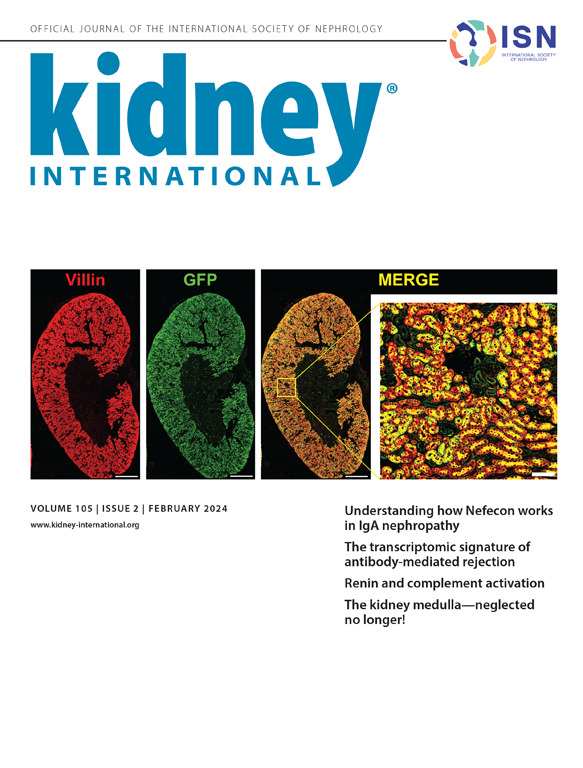Transplantation of human kidney organoids elicited a robust allogeneic response in a humanized mouse model
IF 14.8
1区 医学
Q1 UROLOGY & NEPHROLOGY
引用次数: 0
Abstract
Human kidney organoids derived from embryonic stem cells (ESCs) or induced pluripotent stem cells (iPSCs) have become novel tools for studying various kidney pathologies. Here, we transplanted ESC-derived kidney organoids into humanized mice with a mature human adaptive immune system developed through thymic education. As judged by histology and immunophenotyping, the transplanted HLA-mismatched kidney organoids trigged a robust alloimmune response, characterized by a dense immune cell infiltrate and enhanced memory T cell phenotype in the allograft 30 days post-transplantation. Multiplexed immunofluorescence revealed expression of functional markers of various immune cell infiltrates in response to organoid allografts, mimicking the T cell-mediated rejection process in humans. This validated our model as a novel platform to study various therapeutic strategies to control alloimmunity. Splenocytes isolated from organoid-transplanted hosts showed an alloantigen-specific memory response against 2D kidney organoids ex vivo. Overall, our study indicates that transplanting kidney organoids in humanized mice may be a valuable tool for studying human allogeneic immunity.
人肾类器官移植在人源化小鼠模型中引起了强烈的同种异体反应。
胚胎干细胞(ESCs)或诱导多能干细胞(iPSCs)衍生的人类肾脏类器官已成为研究各种肾脏病理的新工具。在这里,我们将esc来源的肾类器官移植到通过胸腺教育形成成熟的人类适应性免疫系统的人源化小鼠体内。从组织学和免疫表型判断,移植的hla错配肾类器官在移植30天后引发了强烈的同种异体免疫反应,其特征是免疫细胞密集浸润和记忆T细胞表型增强。多重免疫荧光揭示了各种免疫细胞浸润在类器官异体移植反应中的功能标记的表达,模拟了人类T细胞介导的排斥过程。这证实了我们的模型是一个研究控制同种免疫的各种治疗策略的新平台。从类器官移植宿主中分离的脾细胞在体外对2D肾类器官表现出异体抗原特异性记忆反应。总之,我们的研究表明,在人源化小鼠体内移植肾类器官可能是研究人类同种异体免疫的一个有价值的工具。
本文章由计算机程序翻译,如有差异,请以英文原文为准。
求助全文
约1分钟内获得全文
求助全文
来源期刊

Kidney international
医学-泌尿学与肾脏学
CiteScore
23.30
自引率
3.10%
发文量
490
审稿时长
3-6 weeks
期刊介绍:
Kidney International (KI), the official journal of the International Society of Nephrology, is led by Dr. Pierre Ronco (Paris, France) and stands as one of nephrology's most cited and esteemed publications worldwide.
KI provides exceptional benefits for both readers and authors, featuring highly cited original articles, focused reviews, cutting-edge imaging techniques, and lively discussions on controversial topics.
The journal is dedicated to kidney research, serving researchers, clinical investigators, and practicing nephrologists.
 求助内容:
求助内容: 应助结果提醒方式:
应助结果提醒方式:


